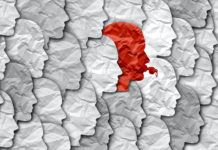Crisis on Campus: Mental Health Counselors Are Feeling the Crush
A dramatic rise in demand for college mental health services has led to counselors feeling burned out. Counseling center directors are looking for solutions.
Anatomy of an Industry: Commerce, Payments to Psychiatrists and Betrayal of the Public Good
Pharmaceutical companies paid psychiatrists $340 million from 2014 through 2020, corrupting every aspect of the testing and marketing of new psychiatric drugs.
Inner Fire: Where Seekers Have a Choice
A Vermont residential community program helps people taper or stay off medications with holistic care embedded in a pastoral setting.
Greg Hitchcock: Voices, Visions, and the Power of Creating
Greg Hitchcock is standing and schmoozing with a cluster of people in the soaring, glass-domed rotunda of what once was a grand old bank...
Screening for Bipolar: Have You Ever Been “Unusually Happy” for More than a Week?
A new questionnaire funded by AbbVie conflates antidepressant side effects with bipolar disorder and doesn’t actually meet the criteria for being considered “screening.”
Grassroots Activism: Rethinking Psychiatry Builds A Community
In the United States and abroad, a growing number of groups have devoted their mission and mindset to rethinking psychiatry, doing their best to...
The Surprising Mental Health Benefits of Volunteering
A program offers psychotherapy in exchange for voluntary service in the community. But the act of volunteering itself can have mental health benefits of its own.
The Lessons of Music: Nurturing Mental Health in Cultures Around the Globe
Music is an ancient and omnipresent tool for wellness, a carrier of peace for individuals, and a bonding agent for communities throughout history and the world.
The False Memory Syndrome at 30: How Flawed Science Turned into Conventional Wisdom ...
Soon after states finally began providing adults who remembered childhood abuse with the legal standing to sue, the FMSF began waging a PR campaign to discredit their memories—in both courtrooms and in the public mind.
Music Aids Mental Health: Science Shows Why
What can science tell us about music’s impact on our cognition and on our mood, on our capacity for empathy, and our sense of connection with others? How does it change the brain? How does it change us?
Making Music, Healing Souls
The healing power of communal singing is at the heart of two organizations in England and Ireland: Sing Your Heart Out and 49 North Street.
Suicide Hotlines Bill Themselves as Confidential—Even as Some Trace Your Call
Every year suicide hotline centers covertly trace tens of thousands of confidential calls, and police come to homes, schools, and workplaces to forcibly take callers to psychiatric hospitals.
The Latest “Breakthrough Therapy”: Expensive New Drugs for Tardive Dyskinesia
The increased prescribing of antipsychotics, which frequently cause a brain injury that manifests as tardive dyskinesia, has provided pharmaceutical companies with a lucrative new market opportunity.
Voting While “Mentally Ill”: A Legacy of Discrimination
Legal and practical barriers to voting disenfranchise people judged "mentally incompetent." The centuries-old, unclear laws and regulations also disproportionately affect people of color.
Diving into Your Soul: Lessons from “Queer Eye”
"Queer Eye" has a fresh, therapeutic twist: Installment after installment, it sends the repeated messages: Take care of yourself. Be kind to yourself. You’re beautiful. You’re good. We love you. Love yourself. Or, in the words of Van Ness: Yass, queen!
An FDA Whistleblower’s Documents: Commerce, Corruption, and Death
In 2008, a reviewer of psychiatric drugs at the FDA, Ron Kavanagh, complained to Congress that the FDA was approving a new antipsychotic that was ineffective and yet had adverse effects that increased the risk of death. Twelve years later, a review of the whistleblower documents reveal an FDA approval process that can lead to the marketing of drugs sure to harm public health.
World Benzodiazepine Awareness Day 2020
This week on MIA Radio, we present the second part of our podcast to join in the events for World Benzodiazepine Awareness Day 2020...
Bedlam: Public Media, Power, and the Fight for Narrative Justice
A new mental health documentary awakens longstanding tensions around voice, representation, and the power to define problems and solutions.
Muzzled by Psychiatry in a Time of Crisis
The American Psychiatric Association and its former president, Jeffrey Lieberman, have used the Goldwater Rule to try to silence Yale psychiatrist Bandy Lee and colleagues who warned, in a collection of essays, about why President Trump is "dangerous." Why would a guild choose to do this?
Life Inside America’s Psychiatric Facilities During the Pandemic: Eyewitness Accounts
Insiders paint a picture of chaos and fear in public and private psychiatric hospitals across the country. "Now that she has been discharged, Sevigny is getting the truth out, just as the nurse asked her to do. She also plans to continue to organizing in her state, with and on behalf of those who continue to be subjected to dangerous conditions in the name of care."
America’s Psychiatric Facilities Are ‘Incubators’ for COVID-19
As the novel coronavirus continues to wreak havoc around the globe, whistleblowers at American psychiatric facilities paint a picture of mismanaged COVID-19 responses and lax safety protocols, putting patients, workers, and the surrounding communities in harm’s way. Some even allege coverups of deaths.
“Not Fragile”: Survivor-Led Mutual Aid Projects Flourish in a Time of Crisis
During the current pandemic, the practice of mutual aid—defined broadly as the ways that people join together to meet one another’s needs for survival and relationship—has become mainstream. Yet, often missing from major media coverage of mutual aid is any acknowledgment of its roots in movements led by marginalized people, including Black and Brown people, disabled people, mad people, and psychiatric survivors.
Mutual Support in an Age of Social Distancing
Connection, whether one-on-one or in groups, is at the heart of peer support. In a time when social distancing and stay-at-home orders proliferate, the Western Massachusetts Recovery Learning Community/Wildflower Alliance (WMRLC) is finding creative ways to adapt to rapidly changing circumstances dictated by the novel coronavirus.
Mental Health Apps: AI Surveillance Enters Our World
While the developers are promoting the apps as a public health initiative, they are effectively an AI that would be snooping on you at all times—ostensibly coming to know you better than you know yourself. And ultimately doing so for commercial purposes that will expand the psychiatric enterprise.
An Open Letter to VA Secretary Robert Wilkie: A Plan for Deprescribing Veteran Suicides
Through my research and experiences, I've found that what the Veterans Administration has been doing to fight the veteran suicide epidemic isn't working and appears to be unintentionally exacerbating it. These problems are fixable. But I need your help.

































